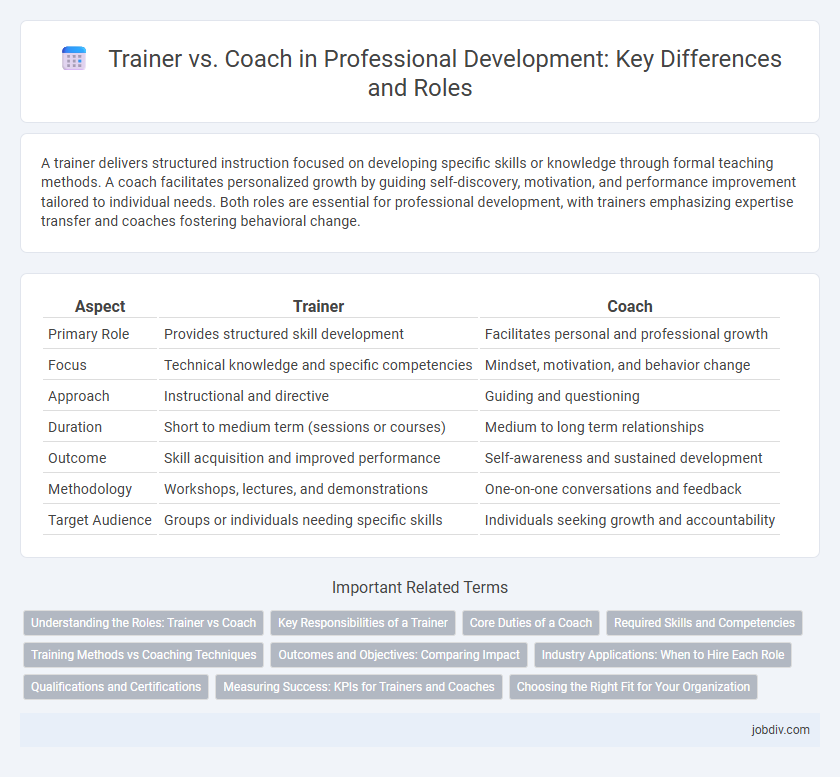A trainer delivers structured instruction focused on developing specific skills or knowledge through formal teaching methods. A coach facilitates personalized growth by guiding self-discovery, motivation, and performance improvement tailored to individual needs. Both roles are essential for professional development, with trainers emphasizing expertise transfer and coaches fostering behavioral change.
Table of Comparison
| Aspect | Trainer | Coach |
|---|---|---|
| Primary Role | Provides structured skill development | Facilitates personal and professional growth |
| Focus | Technical knowledge and specific competencies | Mindset, motivation, and behavior change |
| Approach | Instructional and directive | Guiding and questioning |
| Duration | Short to medium term (sessions or courses) | Medium to long term relationships |
| Outcome | Skill acquisition and improved performance | Self-awareness and sustained development |
| Methodology | Workshops, lectures, and demonstrations | One-on-one conversations and feedback |
| Target Audience | Groups or individuals needing specific skills | Individuals seeking growth and accountability |
Understanding the Roles: Trainer vs Coach
Trainers focus on delivering specific knowledge and skills through structured programs aimed at improving performance in defined areas. Coaches emphasize personalized guidance and development, fostering self-awareness and long-term growth by addressing individual goals and challenges. Understanding these distinct roles helps organizations deploy the right approach for targeted skill acquisition versus holistic personal and professional development.
Key Responsibilities of a Trainer
Trainers design and deliver structured learning programs to develop specific skills and knowledge within a professional setting. They focus on curriculum development, instructional techniques, and performance assessment to ensure participants meet established learning objectives. Trainers also provide hands-on guidance and feedback to enhance employee competency and productivity.
Core Duties of a Coach
A coach facilitates personal and professional growth by guiding individuals to unlock their potential through active listening, powerful questioning, and tailored feedback. They focus on goal-setting, accountability, and developing self-awareness to foster sustainable change and improved performance. Unlike trainers who deliver specific skills or knowledge, coaches cultivate long-term mindset shifts and behavioral transformation.
Required Skills and Competencies
Trainers require expertise in curriculum design, effective communication, and the ability to deliver structured learning sessions that enhance technical skills. Coaches emphasize active listening, emotional intelligence, and personalized feedback to foster individual growth and unlock potential. Both roles demand adaptability and a strong understanding of learner needs to optimize development outcomes.
Training Methods vs Coaching Techniques
Training methods emphasize structured, skill-based instruction designed to develop specific competencies through repetition and standardized exercises. Coaching techniques prioritize personalized, goal-oriented conversations that foster self-awareness, motivation, and behavioral change by leveraging active listening, powerful questioning, and feedback. Effective development programs integrate both training methods and coaching techniques to enhance overall professional growth and performance.
Outcomes and Objectives: Comparing Impact
Trainers deliver structured programs aimed at developing specific skills and knowledge, resulting in measurable improvements in performance and competency within a defined timeframe. Coaches focus on personalized guidance that fosters self-awareness, motivation, and behavioral change, driving long-term growth and sustained achievement of professional goals. The impact of trainers is often quantifiable through assessments and certifications, while coaching outcomes are reflected in enhanced leadership effectiveness and adaptability in complex work environments.
Industry Applications: When to Hire Each Role
Organizations should hire trainers when the goal is to deliver structured skill development, such as technical training or compliance certification, commonly needed in industries like manufacturing, healthcare, and IT. Coaches are better suited for roles that require personalized guidance to enhance leadership, performance, and behavioral change, frequently utilized in executive management and sales sectors. Selecting the right professional depends on whether the focus is on acquiring specific competencies or fostering ongoing personal and professional growth.
Qualifications and Certifications
Trainers typically hold certifications related to instructional design, group facilitation, and subject-matter expertise, often granted by organizations like the Association for Talent Development (ATD) or the International Board of Certified Trainers (IBCT). Coaches require advanced certifications emphasizing personalized development, emotional intelligence, and motivational techniques, such as those offered by the International Coach Federation (ICF) or European Mentoring and Coaching Council (EMCC). These credential distinctions highlight the trainer's focus on structured learning delivery versus the coach's proficiency in individualized behavioral change and performance enhancement.
Measuring Success: KPIs for Trainers and Coaches
Trainers measure success through KPIs such as course completion rates, knowledge retention scores, and skill application assessments, which reflect the effectiveness of structured learning programs. Coaches focus on KPIs like client goal achievement, behavioral change metrics, and ongoing performance improvements, emphasizing personal development outcomes. Both roles rely on data-driven evaluations but prioritize different indicators aligned with training versus developmental objectives.
Choosing the Right Fit for Your Organization
Selecting the right fit between a trainer and a coach hinges on your organization's goals: trainers deliver structured learning and skill development through specific programs, while coaches provide personalized guidance to enhance individual performance and leadership capabilities. Analyzing whether your team needs a scalable training solution or tailored mentorship can optimize development outcomes and improve employee retention rates. Prioritizing clarity in these roles ensures alignment with strategic objectives and maximizes return on human capital investment.
Trainer vs Coach Infographic

 jobdiv.com
jobdiv.com